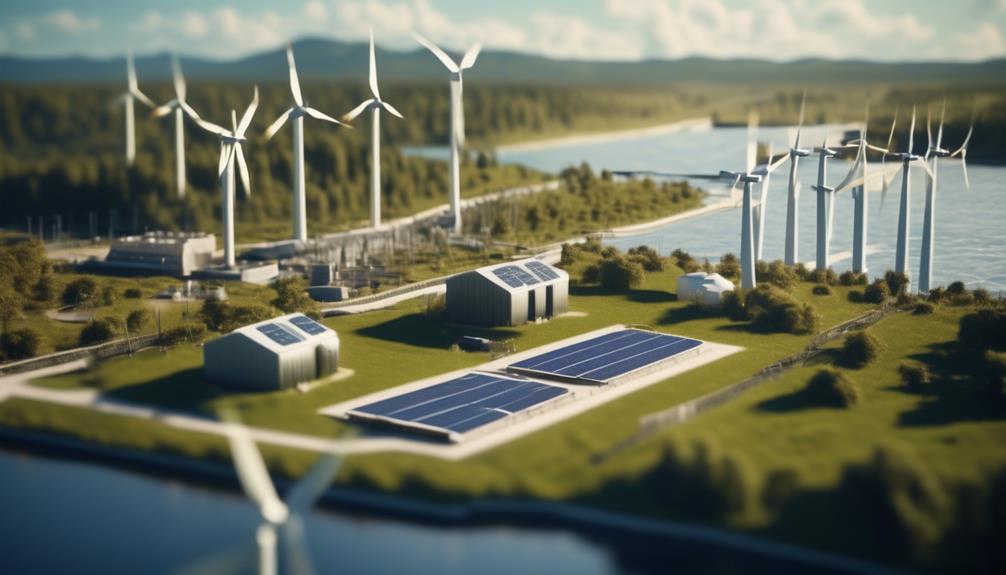In the dynamic landscape of today’s business world, navigating energy management is a complex yet critical task. Business leaders are on a constant quest for strategies that not only reduce costs but also enhance operational efficiency and sustainability. The intricate dance of managing energy demands effectively is a challenge many face, yet the solution lies in understanding the unique intricacies of one’s own business energy needs.
Custom energy management emerges as a beacon of hope, offering a path tailored to the unique challenges and opportunities each business faces. With an expertise grounded in the latest technology and data analytics, custom energy management solutions stand apart. They provide the tools for businesses to gain actionable insights, optimise energy use, and achieve a competitive edge in sustainability efforts.
As we delve deeper, you’ll discover how these tailored solutions can transform your approach to energy management, ensuring that your business not only thrives but also contributes positively to the global environment. Let this journey guide you towards making informed decisions that resonate with your business’s specific ambitions, inviting you to read on and uncover the potential that custom energy management holds for you.
Cost-effective Energy Optimisation Solutions
Cost-effective energy optimisation solutions offer businesses an opportunity to strategically manage their energy consumption, leading to significant cost savings and improved operational efficiency.
Implementing an energy management system (EMS) can effectively reduce energy consumption, ultimately saving money on operational costs. By utilising smart thermostats and room control devices, businesses can create a comfortable work environment, enhancing employee productivity and well-being.
In addition to the financial benefits, energy management systems also play a crucial role in measuring and controlling greenhouse gas emissions, thus reducing the environmental impact and carbon footprint of a business. Furthermore, these systems improve building performance by saving money on utility bills and enhancing the overall experience for guests, residents, and visitors.
The return on investment for energy management systems is substantial, with built-in features designed to reduce energy consumption costs, quick installation, and seamless connection to existing systems. Therefore, opting for cost-effective energy optimisation solutions not only ensures efficient energy usage but also delivers tangible financial and environmental benefits for businesses seeking to take control of their energy consumption.
Enhanced Staff Well-Being and Productivity
Enhancing staff well-being and productivity through the implementation of smart thermostats and room control devices is a fundamental aspect of effective energy management systems in various industries.
Smart thermostats and room control devices create a comfortable work environment, positively impacting employee well-being and productivity. Consistent natural lighting and temperature control enhance energy efficiency, contributing to a positive atmosphere that helps employees succeed and thrive.
Comfortable physical spaces improve employee productivity, making enhanced staff well-being a valuable benefit of energy management systems. This applies to various industries such as hospitality, healthcare, and restaurants, showcasing the wide-reaching impact of energy management systems.
Improved staff well-being and productivity are key benefits of energy management systems, making them a compelling choice for businesses seeking to create a positive work environment. By managing energy usage, consumption costs, and the carbon footprint, businesses can enhance staff well-being, save on utility bills, and contribute to the use of renewable energy, ultimately leading to comprehensive energy management.
Reduced Carbon Footprint and Environmental Impact
Energy management systems play a crucial role in measuring and controlling greenhouse gas emissions, effectively contributing to the reduction of carbon footprint and environmental impact. By optimising energy usage, these systems help reduce the amount of greenhouse gases released into the atmosphere, benefiting both the economic and environmental aspects of business operations.
Implementing changes based on energy management system data can lead to a significant decrease in energy costs and environmental impact. As more companies implement energy management systems, it is projected that global building energy consumption could be reduced by up to 10% by 2040, showcasing the potential for substantial environmental impact.
Every choice made in the business environment leaves a mark on the environment, known as a carbon footprint; therefore, integrating an energy management system not only benefits the company itself but also contributes to a more sustainable and environmentally friendly future.
Furthermore, these systems help companies comply with government regulations related to energy usage and greenhouse gas emissions, providing a comprehensive solution to high energy consumption and its associated environmental impacts.
Improved Building Performance and Efficiency
Improved building performance and efficiency are essential for achieving cost savings and maximising operational productivity. When it comes to energy management, these aspects play a crucial role in optimising energy use and tracking resources accurately, contributing to substantial financial savings.
Modern Energy Management Systems (EMS) improve building performance by saving money on utility bills, allowing funds to be reallocated to other performance areas such as salaries and marketing. Additionally, a comfortable experience for guests, residents, and visitors enhances building performance, contributing to customer satisfaction and retention. Implementing EOS thermostats further contributes to a comfortable environment, ensuring optimal energy usage.
Moreover, EMS helps run businesses more efficiently and see savings across the board, making it a critical component for any organisation looking to prioritise cost-effectiveness and operational excellence.
Maximum Return on Investment and Brand Image
With a focus on optimising financial resources and operational efficiency, businesses can achieve maximum return on investment and bolster their brand image through the strategic implementation of energy management systems.
By customising energy management solutions to the specific needs of a business, companies can effectively reduce their energy consumption costs. This not only leads to significant financial savings but also enhances the bottom line, thus maximising the return on investment.
Additionally, implementing energy management systems allows businesses to showcase their commitment to environmentally friendly practices, which in turn attracts support from investors and stakeholders. The ability to demonstrate efforts to reduce energy usage aligns with consumer values and increases trust in the brand’s environmental sustainability initiatives, ultimately enhancing the brand image.
Furthermore, energy management systems offer built-in features and quick installation, facilitating an immediate impact on both financial savings and brand perception. By investing in these complex systems, businesses can position themselves as resilient to energy price fluctuations, further solidifying their brand reputation.
In essence, the benefits of implementing custom energy management extend beyond saving a significant amount of money; they also contribute to a positive brand image and increased investor confidence.


















